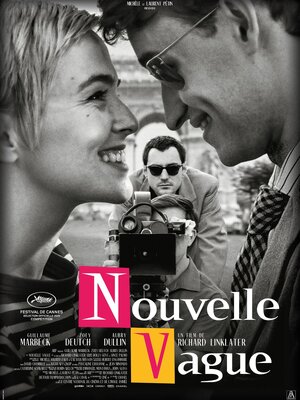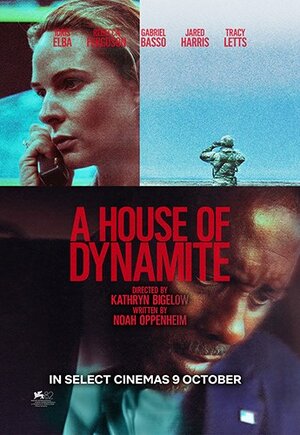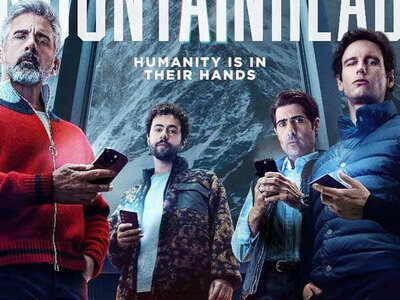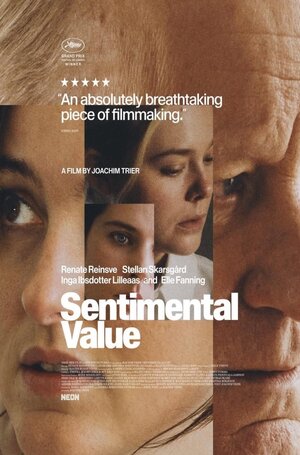an0maly
Distinguished Member
- Messages
- 352
A House of Dynamite
This is a really important film, and one of the ten or so best this year. I am slightly enjoying how it is making some audience members angry, but I will come back to that. I watched it twice, with not much time in between viewings, to clarify my impressions. Kathyrn Bigelow has made two what I'd call thriller-procedural films -- The Hurt Locker and Zero Dark Thirty, both of which display superb directorial skills in creating tension from multiple step operations, and false ideas about the military and recent military history. This film, given what I've read, such as the book on this topic by Daniel Ellsberg, is much more accurate, and that makes it frightening in the extreme.
The story is told in the form of Kurosawa's Roshomon and Kubrick's The Killing, re-tracing in time from sets of different perspectives. Like The Killing, the reason is procedural insight the audience is sequentially given that each set of characters does not fully have, and to show mistakes and lack of knowledge of each. It's a great idea for this narrative.
The core of the story is very like that of Dr Strangelove, and though this is not remotely black comedy, the threat of world nuclear annihilation likewise comes from a totally unpredictable source. There are many references to that film; the biggest, Kubrick had fictionalized the lunatic Curtis LeMay into two Generals, Turgidson and Jack D. Ripper, and these are made into a smooth talking, less overtly crazy General in Bigelow's film, which also clicks off an increasingly tense countdown. People who have not seen Dr. Strangelove in a big theater may not realize it had a very tense countdown sensibility as well, but in its infinite level black comic twist, you actually were tricked into rooting for the bomber to get through Russian defenses and end the human race. You got what you wanted, and people in the theater would applaud Slim Pickens riding the bomb as they laughed.
This film works opposite in theme to Kubrick's film. Here fiction (a trillion miles from our present reality) offers moderate, competent people in the White House and other positions, except that General, I would say. The point here is about an insane system, and not the insane, stupid humans Kubrick (and our 2025 reality) add to the mix. This makes the film more frightening, if possible.
This film has zero "pay off", dare I put it, Zero Dark Payoff. I loved that, while many hate it. You are asked to think, is any outcome good?
HOWEVER... {{spoiler hysterical warning}}
Like Bobby's "You wouldn't even hear it," was one of dozens of tips about the factual end of The Sopranos, that lots of angry viewers never thought about, Bigelow offers the facts with distant subtlety: the second to last shot has twin straight vapor trails in the background sky, close together, suggesting other missiles coming in or going out.
This is a really important film, and one of the ten or so best this year. I am slightly enjoying how it is making some audience members angry, but I will come back to that. I watched it twice, with not much time in between viewings, to clarify my impressions. Kathyrn Bigelow has made two what I'd call thriller-procedural films -- The Hurt Locker and Zero Dark Thirty, both of which display superb directorial skills in creating tension from multiple step operations, and false ideas about the military and recent military history. This film, given what I've read, such as the book on this topic by Daniel Ellsberg, is much more accurate, and that makes it frightening in the extreme.
The story is told in the form of Kurosawa's Roshomon and Kubrick's The Killing, re-tracing in time from sets of different perspectives. Like The Killing, the reason is procedural insight the audience is sequentially given that each set of characters does not fully have, and to show mistakes and lack of knowledge of each. It's a great idea for this narrative.
The core of the story is very like that of Dr Strangelove, and though this is not remotely black comedy, the threat of world nuclear annihilation likewise comes from a totally unpredictable source. There are many references to that film; the biggest, Kubrick had fictionalized the lunatic Curtis LeMay into two Generals, Turgidson and Jack D. Ripper, and these are made into a smooth talking, less overtly crazy General in Bigelow's film, which also clicks off an increasingly tense countdown. People who have not seen Dr. Strangelove in a big theater may not realize it had a very tense countdown sensibility as well, but in its infinite level black comic twist, you actually were tricked into rooting for the bomber to get through Russian defenses and end the human race. You got what you wanted, and people in the theater would applaud Slim Pickens riding the bomb as they laughed.
This film works opposite in theme to Kubrick's film. Here fiction (a trillion miles from our present reality) offers moderate, competent people in the White House and other positions, except that General, I would say. The point here is about an insane system, and not the insane, stupid humans Kubrick (and our 2025 reality) add to the mix. This makes the film more frightening, if possible.
This film has zero "pay off", dare I put it, Zero Dark Payoff. I loved that, while many hate it. You are asked to think, is any outcome good?
HOWEVER... {{spoiler hysterical warning}}
Like Bobby's "You wouldn't even hear it," was one of dozens of tips about the factual end of The Sopranos, that lots of angry viewers never thought about, Bigelow offers the facts with distant subtlety: the second to last shot has twin straight vapor trails in the background sky, close together, suggesting other missiles coming in or going out.





